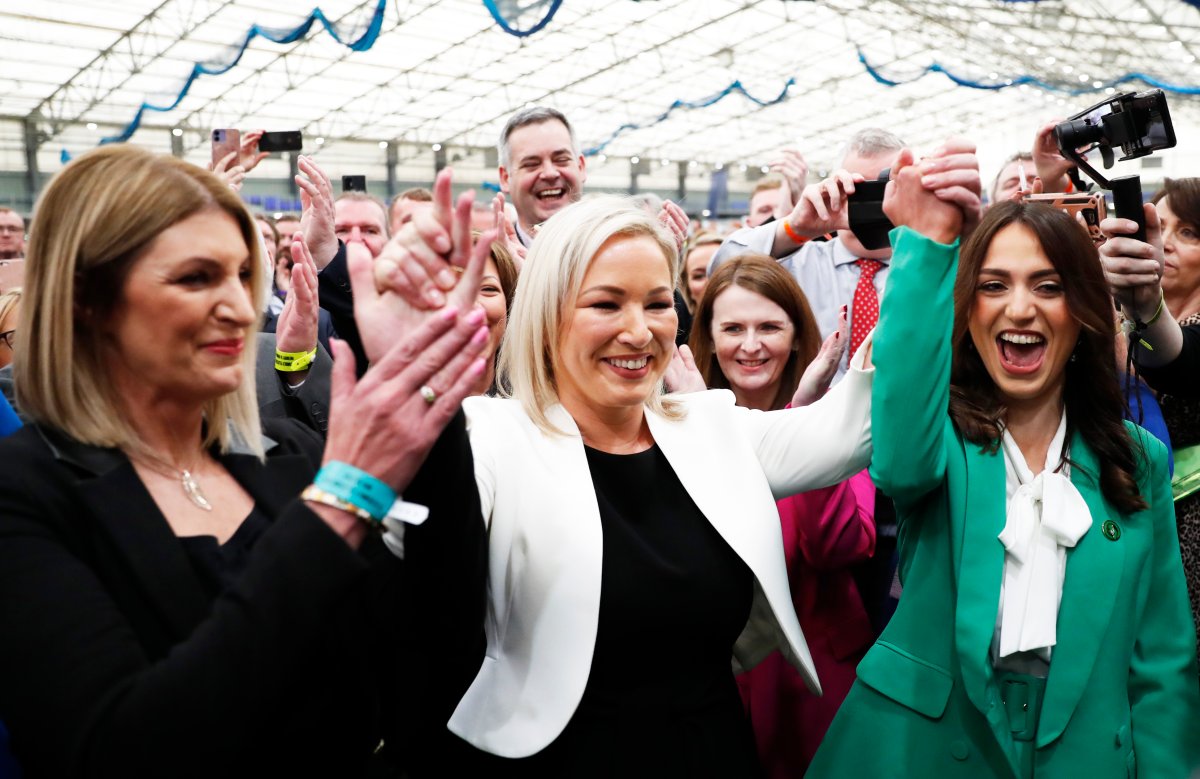Sinn Fein, the former political wing of the Irish Republican Army (IRA), hailed its first victory in a Northern Ireland Assembly election as a “defining moment” for the British-controlled region and called for a debate on a united Ireland.

Sinn Fein was ahead of the pro-British Democratic Unionist Party (DUP) by 27 to 24 seats with two left to declare, making it the first Irish nationalist party to become the largest in the devolved assembly.
“Today represents a very significant moment of change. It’s a defining moment in our politics and for our people,” said the head of Sinn Fein in Northern Ireland, Michelle O’Neill, whose party secured 29% of first-preference votes to the DUP’s 21.3%.
She said there should now be an “honest debate” around the party’s goal of unifying the territory with the Republic of Ireland.
The victory will not change the region’s status, as the referendum required to leave the United Kingdom is at the discretion of the British government and likely years away.
But the symbolic importance is huge, ending a century of domination by pro-British parties, supported predominantly by the region’s Protestant population.
The DUP, a leading proponent of Britain’s exit from the European Union, saw support undermined in part due to its role in post-Brexit talks between London and Brussels that resulted in trade barriers between Northern Ireland and the rest of the United Kingdom.

'Historic result'
Scottish First Minister Nicola Sturgeon, who is also leading a campaign to secede from the United Kingdom, was among the first to congratulate Sinn Fein in a Twitter post that hailed a “truly historic result.”

Get breaking National news
While the largest party has the right to put forward a candidate for First Minister of Northern Ireland’s compulsory power-sharing government, disagreements with the DUP mean such an appointment could be months away.
Asked by a journalist if she expected to become the region’s first Irish nationalist First Minister, O’Neill said: “The people have spoken.”
- Quebec premier calls on Bloc Québécois to help topple Trudeau government
- NDP to join Bloc in backing Liberals against non-confidence vote
- Via Rail CEO calls 10-hour train delay ‘unacceptable,’ says new evacuation plan in place
- Ethics commissioner will not investigate Boissonnault over ‘Randy’ texts, says the matter is closed
DUP leader Jeffrey Donaldson said his party would not join the government unless the protocol governing Northern Ireland’s trade with the rest of the UK following its exit from the European Union was totally overhauled.
The DUP’s campaign focused on a promise to scrap what it calls a border in the Irish Sea.
Donaldson said he would see what British Prime Minister Boris Johnson says on the topic in a speech next week before deciding his next move. Read full story
The British government’s minister for Northern Ireland Brandon Lewis in a statement called on the parties to form an executive as soon as possible.
All-Ireland aspirations
Sinn Fein was long shunned by the political establishment on both sides of the Irish border for its links to Irish Republican Army violence during three decades of fighting over Northern Ireland’s place within the United Kingdom that ended with a 1998 peace deal.
Since then it has reinvented itself to become the most popular party in the Republic of Ireland, where it has carved out a successful base by campaigning on everyday issues such as the cost of living and healthcare.

It followed a similar path in the Northern Irish elections, where it focused on economic concerns rather than Irish unity to appeal to middle-ground voters.
The election follows demographic trends that have long indicated that pro-British Protestant parties would eventually be eclipsed by predominantly Catholic Irish nationalist parties who favor uniting the north with the Republic of Ireland.
All unionist candidates combined secured slightly more votes than all nationalists in Thursday’s election.
The cross-community Alliance Party scored its strongest ever result with 17 seats as it bids to establish itself as a third pillar of the political system.
(Writing by Conor Humphries; editing by Clelia Oziel and Frank Jack Daniel)







Comments